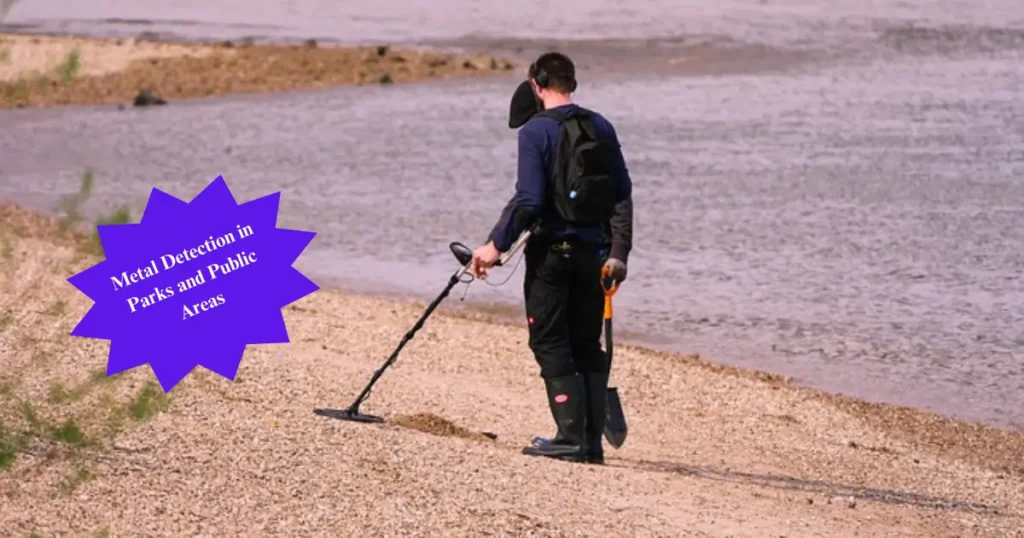Metal detecting is a fascinating hobby that offers the thrill of uncovering hidden treasures, from lost coins and jewelry to rare relics. However, venturing into parks and public areas with your metal detector comes with legal responsibilities and safety concerns. To avoid fines or legal trouble, it’s essential to understand the rules and regulations that govern metal detecting in public spaces. In this comprehensive guide, you will learn how to metal detect in parks and public areas legally and safely, along with expert tips, best practices, and safety precautions to enhance your metal detecting experience.

What Is Metal Detecting and Why Is It Popular?
Metal detecting involves using a device called a metal detector to locate metallic objects underground. This hobby attracts people of all ages, from treasure hunters seeking rare finds to hobbyists enjoying a day of exploration.
Why is metal detecting popular?
- Thrill of discovery: Unearthing coins, relics, or historical artifacts offers excitement and a sense of adventure.
- Potential for profit: Some detectorists sell valuable finds, making it a lucrative side hobby.
- Exercise and relaxation: It offers a combination of light physical activity and the relaxation of spending time outdoors.
However, before you start metal detecting in public areas, it’s important to know the legalities and regulations to avoid any issues.
Understanding the Legalities of Metal Detecting in Public Areas
Before heading out with your metal detector, you need to understand the public area metal detecting rules that govern local, state, and federal lands.
1. Learn the Laws in Your Region
Laws regarding metal detecting vary by location. In some areas, it is completely legal, while in others, you need permits or face strict restrictions.
- State Parks: Many states have specific regulations regarding metal detecting in parks. Some allow it in designated areas, while others ban it entirely.
- City Parks: Local municipalities often have their own rules. Some cities require a permit, while others allow detecting without restrictions.
- Federal Lands: Metal detecting is generally prohibited on federal lands, such as national parks, battlefields, and historic sites, due to preservation laws.
✅ Tip: Research your region’s metal detecting rules by visiting the local government’s website or contacting the park’s management office.
2. Understand the ARPA and Antiquities Act
In the U.S., two major laws regulate metal detecting on public lands:
- The Archaeological Resources Protection Act (ARPA): Prohibits metal detecting on federal or archaeological sites without a permit.
- The Antiquities Act: Protects historical and archaeological artifacts, making it illegal to remove or keep them.
If you unknowingly dig up an artifact, it may be illegal to keep it, even if found on public land.
3. Obtain Necessary Permits
In many public areas, you will need a permit to metal detect legally.
- Where to apply: Visit your local city or county office to obtain a permit.
- Permit guidelines: Follow the guidelines on where and when you can detect, and always carry the permit with you.
✅ Tip: Permit costs and regulations vary by location. Some cities offer free permits, while others charge a small fee.
4. Avoid Private Property Without Permission
Detecting on private property without permission is trespassing and can lead to legal action.
- Always obtain written permission from the property owner.
- Discuss agreements regarding valuable finds in advance.
Common Legal Mistakes in Metal Detecting
Even experienced detectorists sometimes make legal mistakes. Here are common pitfalls to avoid:
- Detecting on restricted land: Always verify if metal detecting is allowed in the area you plan to search.
- Failure to obtain a permit: Many parks and public spaces require permits, and detecting without one can lead to fines.
- Removing historical artifacts: If you discover any items of historical or archaeological value, report them to local authorities.
- Ignoring digging regulations: Some parks limit how deep you can dig. Ensure you follow these guidelines.
✅ Tip: When in doubt, always ask local authorities before metal detecting in a new location.
How to Metal Detect in Parks and Public Areas Legally and Effectively

Once you understand the legal aspects, it’s time to focus on effective techniques for successful and safe metal detecting.
1. Choose the Right Metal Detecting Equipment
Using the proper gear enhances your detecting accuracy and protects the environment.
- Metal Detector: Choose a model with discrimination settings to filter out unwanted trash.
- Pinpointer: A handheld pinpointer helps you locate small targets with precision.
- Headphones: Use headphones to avoid disturbing park visitors.
- Digging Tools: Use a small hand trowel or sand scoop to minimize ground disturbance.
- Finds Pouch: Carry a pouch to store your discovered items safely.
✅ Tip: For public parks, opt for a lightweight, beginner-friendly metal detector with adjustable sensitivity settings.
2. Best Locations for Metal Detecting in Parks
To increase your chances of success, target high-traffic areas where people are likely to lose valuables.
- Playgrounds and picnic areas: Frequent activity areas often contain lost jewelry, coins, and keys.
- Walking trails: Detecting along trails can yield interesting finds like lost watches or coins.
- Beachfronts and lakesides: Parks with water bodies are prime spots for lost rings and necklaces.
- Event grounds: Parks that host concerts or festivals often contain recently dropped valuables.
✅ Tip: Detect early in the morning or during off-peak hours to avoid crowds.
Park Metal Detecting Regulations and Best Practices
To stay compliant with park metal detecting regulations, follow these best practices:
- Follow posted rules: Many parks display rules regarding metal detecting. Always read and follow them.
- Stay in permitted areas: If you have a permit, stick to the authorized detecting zones.
- Minimize ground disturbance: Use small tools and avoid deep holes.
- Leave no trace: Always refill any holes you dig and remove trash.
✅ Tip: Carry a small trash bag to collect and dispose of any litter you encounter.
Safety Tips for Metal Detecting in Public Areas
While metal detecting is generally safe, taking precautions is essential:
- Stay hydrated: Carry water to prevent dehydration during long detecting sessions.
- Use sun protection: Apply sunscreen and wear a hat in sunny weather.
- Wear gloves: Protect your hands from sharp objects or glass.
- Be aware of wildlife: In wooded areas, watch out for snakes or insects.
- Detect with a buddy: It’s safer and more enjoyable to metal detect with a friend.
✅ Tip: Carry a first-aid kit in case of minor injuries.
How to Dig and Recover Targets Responsibly
Ethical and responsible digging is vital to preserving public areas.
- Use proper tools: Opt for small hand trowels instead of large shovels to minimize damage.
- Cut neat plugs: When digging, cut a clean plug of grass and soil. Flip it over carefully to preserve the turf.
- Fill all holes: Always refill holes to avoid creating tripping hazards.
- Leave the area cleaner: Remove any trash you find, even if it’s not yours.
✅ Tip: Parks often have designated digging zones. Use only these areas to avoid fines.
What to Do If You Find Valuable or Historical Items
If you discover items of value or historical significance, take the following steps:
- Report historical artifacts: Notify local authorities if you find relics or coins with historical value.
- Document your find: Take photos and record details about the location and item.
- Follow local laws: In some areas, valuable items must be turned over to the authorities.
✅ Tip: Research your region’s treasure trove laws to understand your rights regarding valuable finds.
Conclusion: Enjoy Metal Detecting Legally and Safely
Metal detecting in parks and public areas is a rewarding and exciting hobby, but it requires responsibility. By following public area metal detecting rules, obtaining necessary permits, and respecting park regulations, you can enjoy this pastime without legal issues.
Are you ready to start your metal detecting adventure? Do your research, obtain permits, and detect responsibly for a fun and legally compliant experience!











